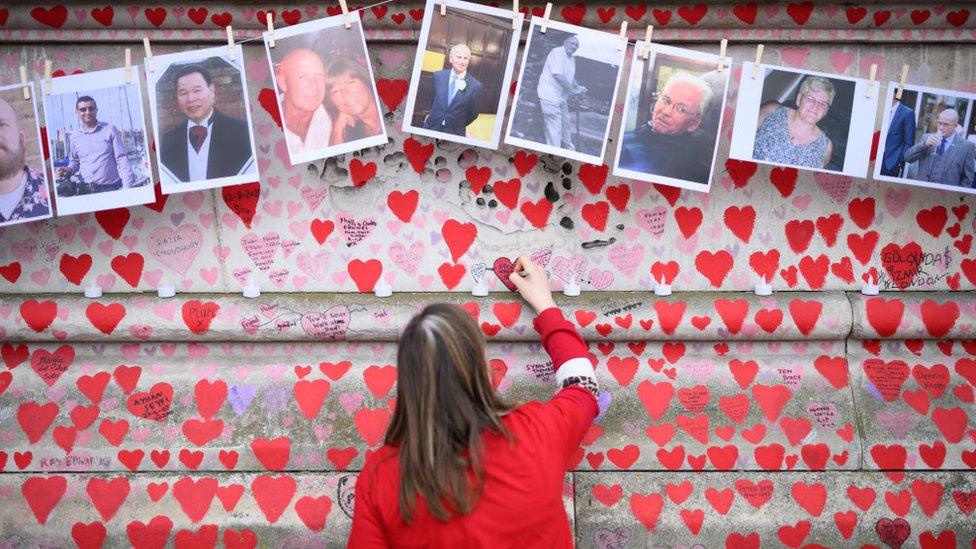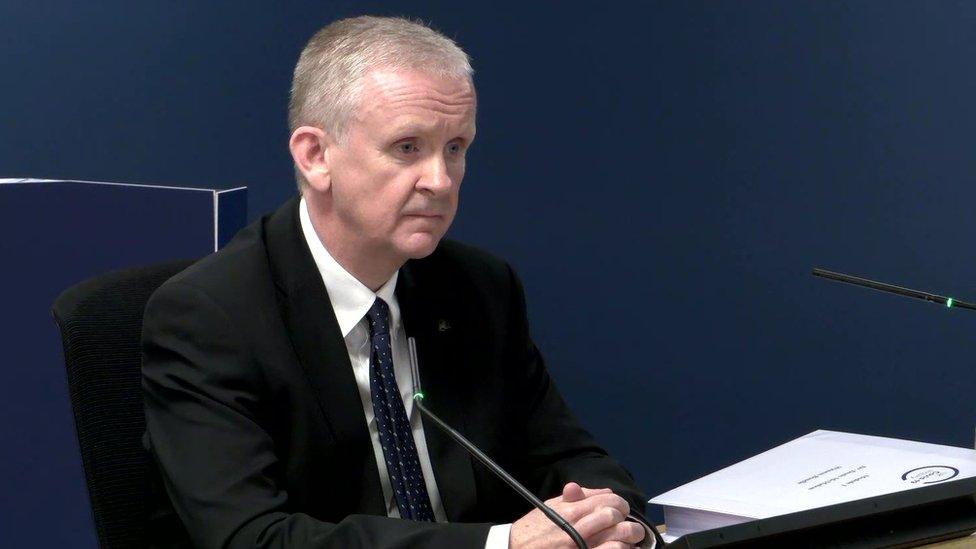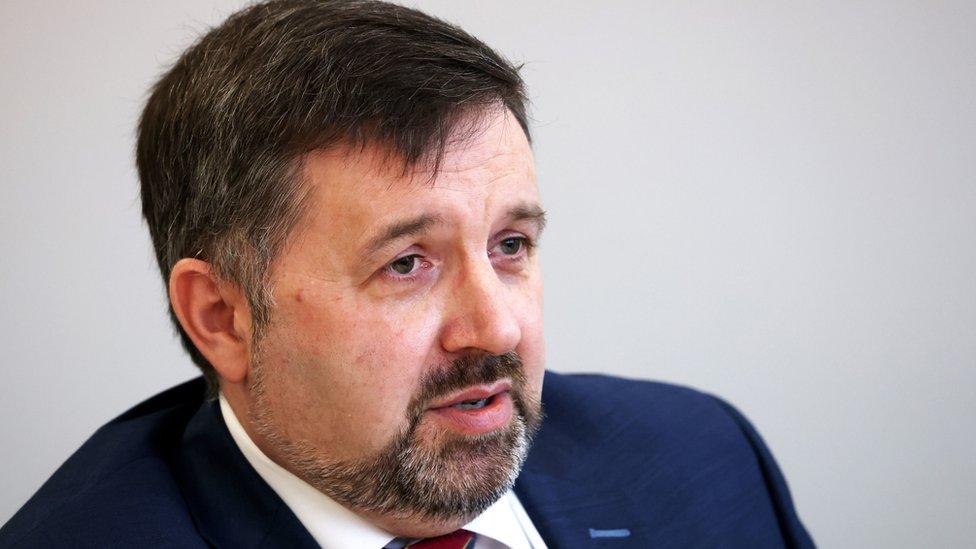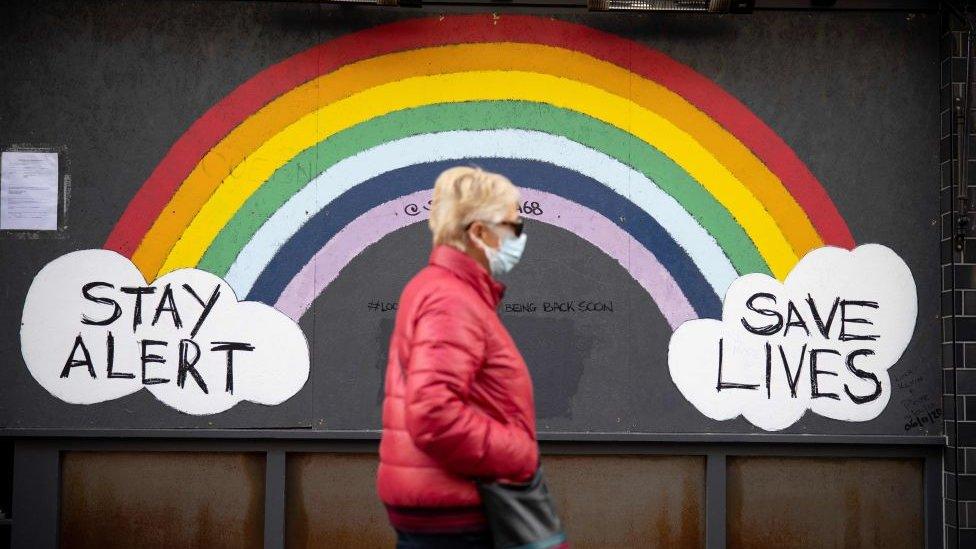Covid inquiry: Failed reforms hindered NI Covid response, says Swann
- Published

The inquiry is into the government's handling of the coronavirus pandemic
A failure to invest or reform the health service in Northern Ireland hindered its ability to respond to the pandemic, a former health minister has said.
Robin Swann was giving evidence at the UK Covid inquiry on Thursday.
He said short-term decisions were preferred over long-term planning and that many decisions were "ducked".
Mr Swann said many opportunities were missed due to the lack of a functioning executive between 2017 and 2020.
Giving evidence earlier on Thursday, Denis McMahon, the permanent secretary at the Executive Office, said the absence of ministers in the run-up to the pandemic left officials "flying blind".
He said the lack of ministers between 2017 and 2020 had an impact on emergency planning.
The first phase of the inquiry is examining the preparedness of the UK government and devolved administrations in the run-up to the pandemic.
It is taking a forensic look at the structure and mechanics of the Northern Ireland government machine, which Dr McMahon said led to Stormont departments working independently and was a "complicated process".
The executive collapsed during that period after Sinn Féin pulled out over a green energy scandal in 2017.
Dr McMahon was not in the same post during that time, but he said he spoke to colleagues in preparation for the inquiry hearing.
'Ministers provide focus'
When asked by Hugo Keith KC, lead counsel to the inquiry, what impact the absence of ministers has on contingency planning, Dr McMahon said he could not point to specific operational decisions.
He said: "A lot of the decisions that are required for emergency planning are operational decisions and can happen without ministers there, and indeed that should be the case.
"However, they provide a focus, they have an understanding of what's going on on the ground and they have the legitimacy of being democratically accountable."
He added that to some extent, without ministerial direction, civil servants were "flying blind".

Denis McMahon is giving evidence to the inquiry in London
Dr McMahon said ministers were "fundamental to the operation of government" and described their absence as "unacceptable".
When asked by lead counsel if the absence of proper resourcing between 2017 and 2020 had a "deleterious" impact on the proper maintenance of civil contingencies procedures, the permeant secretary said it had.
He also said preparing for Brexit meant they had to "cannibalise" Stormont departments where they lost around 4,400 staff between 2014 and 2017 and those are staff which they never got back.
The inquiry heard that plans around civil contingencies "were not properly maintained" with no fully developed cross-government audit arrangements to assess emergency contingencies.
Questioning also touched on the Northern Ireland administration's cooperation with the government in London.
Dr McMahon was asked whether Stormont ministers and officials should have been more involved in UK-wide planning on the Sage committee, on which there was no automatic representation for Northern Ireland.
He said devolved administrations should be represented as "these kinds of pandemics cross boundaries".

Robin Swann was in post at Stormont throughout the pandemic and a key figure in delivering the public health message
Mr Swann was appointed health minister when the Northern Ireland Executive re-formed weeks before the Covid outbreak.
It is the first time that a Northern Ireland politician appeared at the public hearings in London.
Speaking to the hearing, Mr Swann opened by fiving his condolences to the all those bereaved during the pandemic and expressed his gratitude to healthcare workers.
Mr Swann became health minister in January 2020 after a period of three years in which the power-sharing government at Stormont hadn't been working due to a fallout between the main political parties.
Mr Swann said that the health service suffered from a lack of reform, strategic direction and long-term planning during that political hiatus.
He also told the inquiry that his first job after his appointment was to deal with healthcare workers' industrial action over pay.
He said "When I came into office in January 2020 we had the worst waiting lists in the United Kingdom - we still have the worst waiting lists,.
"There were... decisions that were ducked, that were missed, that could've been taken should we have had a functioning assembly."
The inquiry into the UK's handling of Covid is hearing from senior politicians, health officials and experts
It was announced by the former Prime Minister Boris Johnson in 2021 and is due to hold public sessions until 2026.
This module of the inquiry is examining how prepared the UK was to deal with the impact of a global pandemic.
Among the areas being examined is the impact of power-sharing government in Northern Ireland being interrupted, sometimes for years at a time, on all departments.
The inquiry is expected to hear from key figures from Northern Ireland over the next seven days.
What is said is bound to trigger difficult memories for families and the public in general, as policies around personal protective equipment (PPE), social distancing and visiting hospitals and care homes are discussed.
Baroness Heather Hallett, who is chairing the inquiry, has already met with some of those who lost loved ones.
At the time she said she was "struck by the devastating nature of their loss and at times their inability to grieve".
Thursday's session was watched in Belfast by members of the campaign group Northern Ireland Bereaved Families for Justice.
Related topics
- Published14 June 2023

